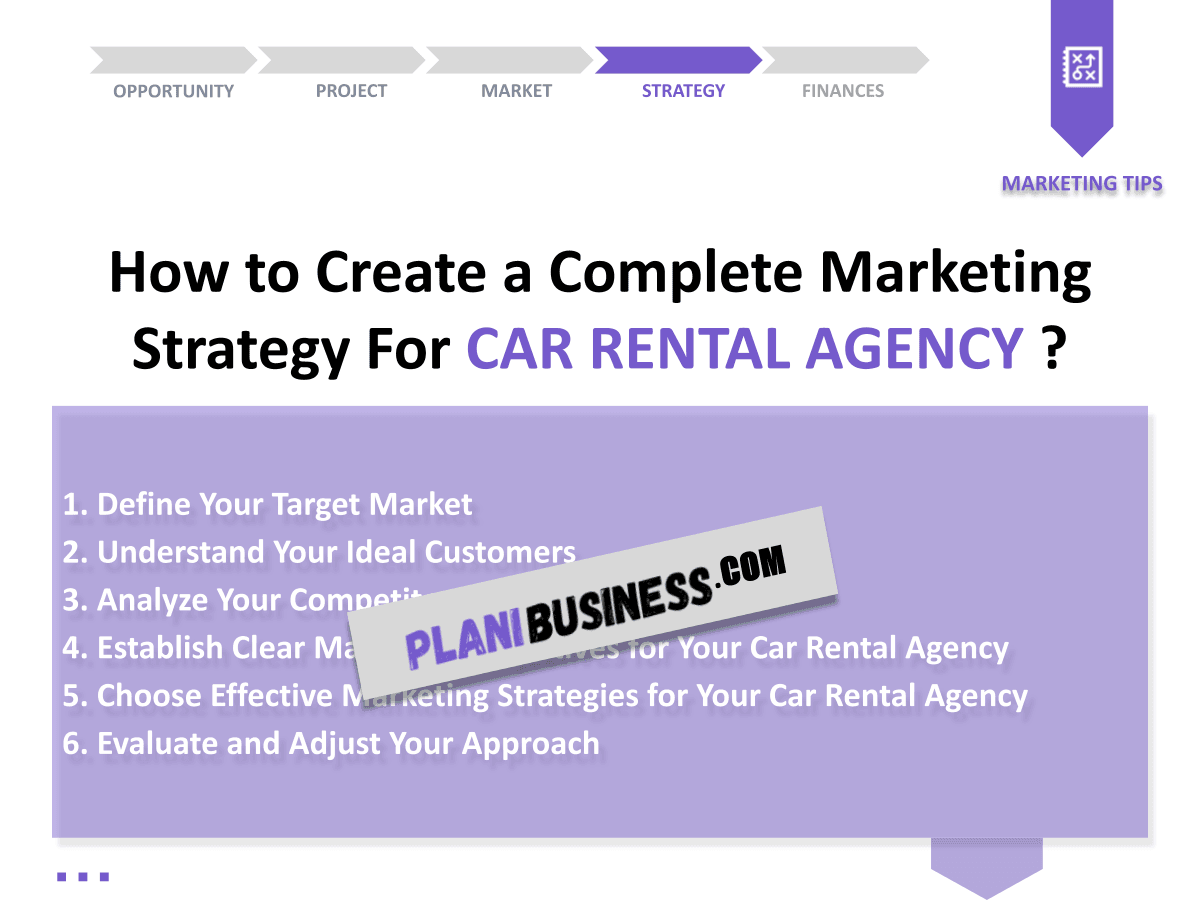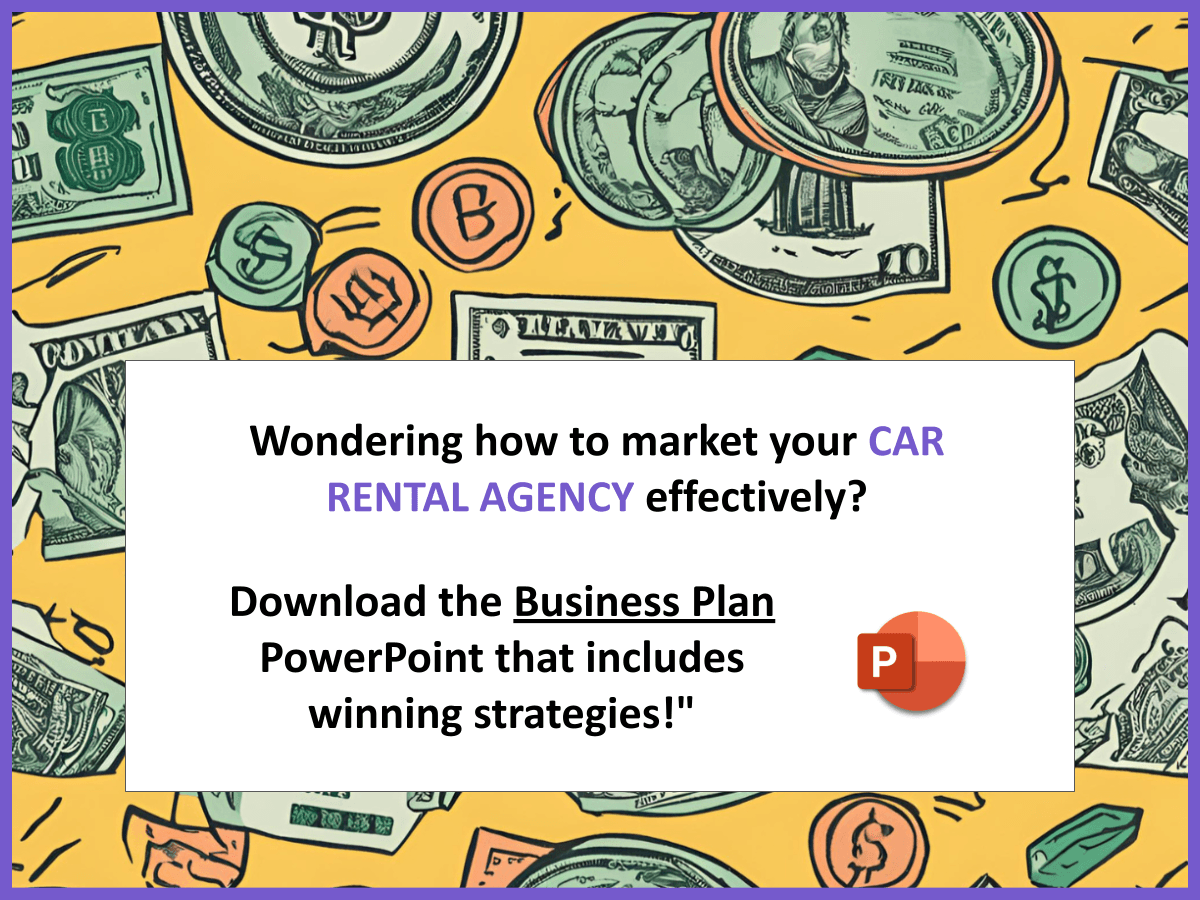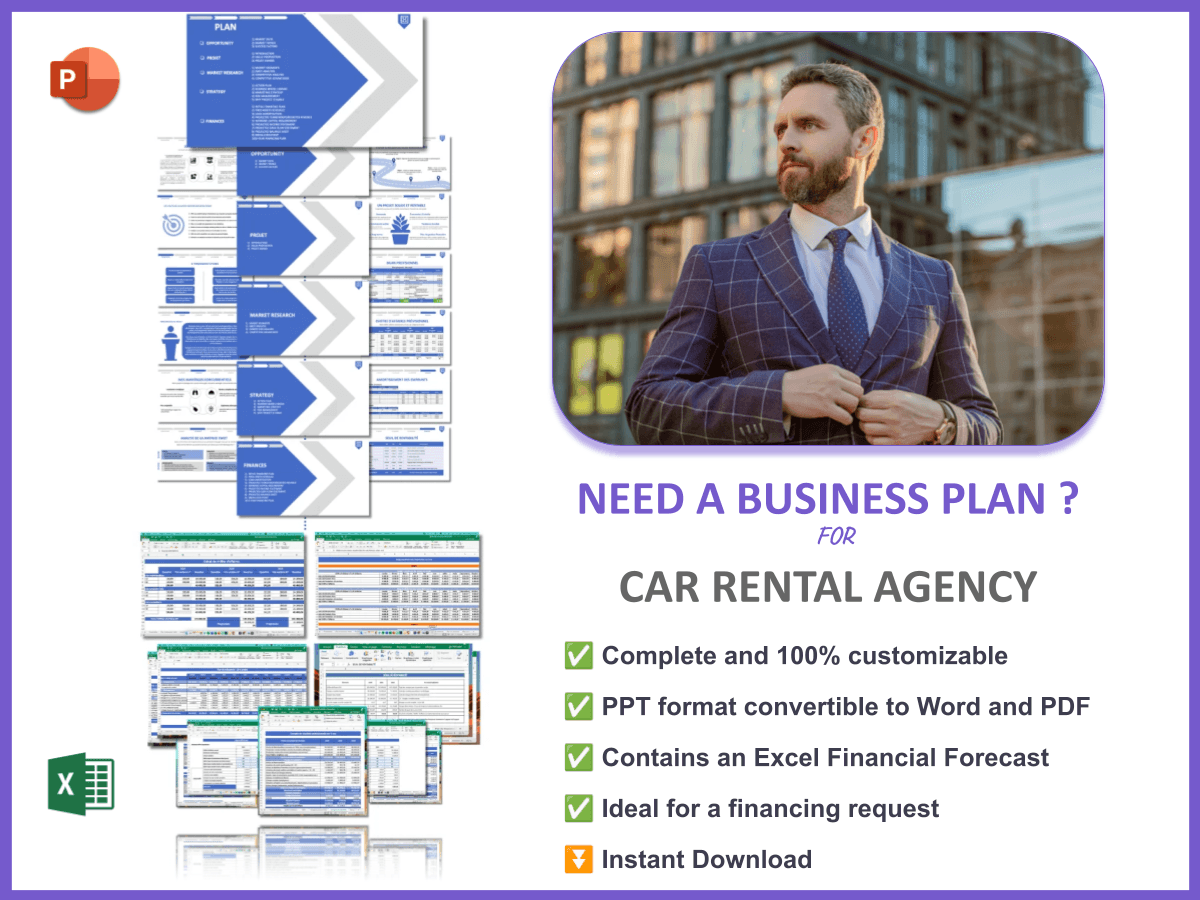Are you thinking about starting a car rental agency? You’re not alone! The car rental industry is booming, and with the right Car Rental Agency Marketing Plan, you can carve out your niche and thrive. Did you know that the global car rental market is expected to grow by over 10% in the next few years? That’s a massive opportunity for aspiring entrepreneurs like you!
A Car Rental Agency Marketing Plan is a strategic roadmap that outlines how you will promote your services, attract customers, and grow your business. In this article, we will cover:
- Defining your target market
- Understanding your ideal customers
- Analyzing competitors
- Setting clear marketing objectives
- Selecting effective marketing strategies
- Evaluating and adjusting your approach
- Examples of marketing plans
1. Define Your Target Market
| Market Segment | Characteristics | Potential Reach |
|---|---|---|
| Business Travelers | Frequent flyers, corporate accounts | High |
| Tourists | Vacationers, families | Medium |
| Local Residents | Occasional renters, special events | Medium |
Understanding who your customers are is key. This means defining demographic details like age, income, and travel habits. You can use surveys or market research to gather this information and create targeted campaigns.
Consider using tools like Google Trends or social media insights to dive deeper into your audience’s preferences. This will help you tailor your marketing messages effectively. Remember, the more specific you are about your target market, the better your chances of success.
2. Understand Your Ideal Customers
| Customer Type | Needs | Preferred Channels |
|---|---|---|
| Business Travelers | Convenience, reliability | Email, corporate partnerships |
| Vacationers | Affordability, fun options | Social media, travel websites |
Identifying what your ideal customers look for in a car rental service is crucial. Are they after luxury, budget-friendly options, or something unique? Tailoring your offerings to meet their needs can set you apart.
For example, if your target market consists of business travelers, you might want to highlight features like easy booking, loyalty programs, or premium vehicle options. On the other hand, if your focus is on vacationers, consider showcasing family-friendly vehicles or fun extras like GPS systems or child seats.
Finally, don’t forget to gather customer feedback regularly. This will help you adapt your services to meet their evolving needs, ensuring you stay ahead of the competition!
3. Analyze Your Competitors
| Competitor | Strengths | Weaknesses |
|---|---|---|
| Local Rental Company A | Strong local presence | Limited vehicle options |
| National Rental Chain B | Brand recognition | Higher prices |
Taking a close look at what your competitors are doing is vital for your Car Rental Agency Marketing Plan. This analysis can help you identify market gaps and opportunities. What strategies are they using? What can you learn from them? This information will help you find your unique selling proposition (USP).
Consider conducting a SWOT analysis (Strengths, Weaknesses, Opportunities, Threats) for each major competitor. This will give you a clearer picture of where you stand in the market and how you can differentiate yourself. For instance, if a competitor has a strong online presence but lacks customer service, you can capitalize on that by emphasizing your superior customer service in your marketing materials.
Additionally, check out customer reviews on platforms like Yelp or Google Reviews. They can provide insights into what customers value and what they dislike about your competitors. Use this information to refine your own offerings and marketing strategies!
4. Establish Clear Marketing Objectives for Your Car Rental Agency
| Objective | Measurement | Timeframe |
|---|---|---|
| Increase bookings by 20% | Monthly sales reports | 6 months |
| Grow social media followers by 50% | Social media analytics | 3 months |
Setting specific, measurable goals will keep your marketing plan on track. Aim for objectives that challenge you but are also realistic. For example, if you’re currently booking 100 rentals a month, targeting a 20% increase to 120 rentals is a tangible goal.
When establishing your marketing objectives, consider using the SMART criteria: Specific, Measurable, Achievable, Relevant, and Time-bound. This framework helps ensure your objectives are clear and actionable. For instance, instead of saying “I want more customers,” say “I want to increase my monthly bookings by 20% within the next six months.” This clarity will guide your marketing efforts and help you measure success effectively.
Lastly, don’t forget to review your objectives regularly. As your business grows and market conditions change, your goals may need to be adjusted. Being flexible and responsive is key to sustaining long-term success in the competitive car rental industry.
5. Choose Effective Marketing Strategies for Your Car Rental Agency
| Strategy | Description | Expected Outcome |
|---|---|---|
| Social Media Advertising | Targeted ads on platforms like Facebook and Instagram | Increased brand awareness |
| Email Marketing | Regular newsletters with promotions | Higher customer retention |
When it comes to your Car Rental Agency Marketing Plan, exploring various channels is essential. Social media advertising can help you reach a larger audience quickly. Platforms like Facebook and Instagram allow you to target specific demographics, making your ads more effective.
On the other hand, email marketing is a powerful tool for maintaining relationships with past customers. Sending out regular newsletters with promotions, tips, or updates can keep your agency top-of-mind. Additionally, personalized emails can increase customer loyalty and encourage repeat business.
Consider incorporating a mix of online and offline strategies. For example, collaborating with local hotels or travel agencies can provide valuable referrals. Offering exclusive discounts to their customers can create a win-win situation.
Finally, don’t underestimate the power of content marketing. Creating valuable content, such as blogs or videos about travel tips or car maintenance, can position your agency as an authority in the industry. This approach can improve your SEO and drive organic traffic to your website.
6. Evaluate and Adjust Your Approach
| Metric | Analysis Tool | Action |
|---|---|---|
| Website Traffic | Google Analytics | Optimize SEO strategies |
| Customer Feedback | Surveys | Improve service based on feedback |
Regularly assessing your marketing efforts is crucial for the success of your Car Rental Agency Marketing Plan. Utilizing tools like Google Analytics can help you track website traffic and understand user behavior. If you notice a drop in traffic, it might be time to revisit your SEO strategies or content quality.
Additionally, gathering customer feedback through surveys can provide insights into their experiences. This information is invaluable for identifying areas of improvement. If customers mention issues with booking or vehicle availability, addressing these concerns can enhance customer satisfaction and loyalty.
Don’t forget to stay updated on industry trends and adjust your strategies accordingly. The market is always evolving, and being adaptable will keep your agency competitive. Regular evaluations will ensure that your marketing efforts are aligned with your business goals and customer needs.
7. Example N°1 of marketing plan for a Car Rental Agency
| Steps | Actions | Details |
|---|---|---|
| 1 | Target Market | Focus on business travelers and tourists. |
| 2 | Ideal Customers | Identify needs through surveys. |
| 3 | Competitors | Analyze local competitors’ strengths. |
| 4 | Marketing Objectives | Set a goal to increase bookings. |
| 5 | Marketing Strategies | Implement social media advertising. |
| 6 | Evaluation | Monthly review of performance metrics. |
This example outlines a straightforward marketing plan for a car rental agency. By focusing on both business travelers and tourists, the agency can tap into two lucrative segments of the market. The first step is to conduct surveys to understand the ideal customers better, allowing the agency to tailor its offerings to meet their needs.
Next, analyzing local competitors helps identify strengths and weaknesses in the market. Setting clear marketing objectives, such as increasing bookings by a specific percentage, provides a measurable goal to work towards. Implementing targeted social media advertising can help reach these customers effectively.
Lastly, regular evaluations of performance metrics will keep the marketing plan on track. Adjustments can be made based on what strategies are working best, ensuring continuous improvement.
8. Example N°2 of marketing plan for a Car Rental Agency
| Steps | Actions | Details |
|---|---|---|
| 1 | Target Market | Focus on local residents for events. |
| 2 | Ideal Customers | Target families and groups. |
| 3 | Competitors | Check pricing of local competitors. |
| 4 | Marketing Objectives | Increase social media engagement by 30%. |
| 5 | Marketing Strategies | Leverage local partnerships. |
| 6 | Evaluation | Track engagement through analytics. |
This marketing plan example targets local residents, particularly families and groups, who may need rental cars for events or special occasions. By focusing on this niche, the agency can tailor its services to meet their unique needs.
Identifying ideal customers is crucial, as it allows the agency to craft targeted marketing messages that resonate. Checking competitors’ pricing helps ensure that the agency remains competitive while offering value.
The objective of increasing social media engagement by 30% is a specific goal that can be tracked through various analytics tools. Leveraging local partnerships with event planners or venues can create mutual benefits, driving referrals and increasing bookings.
Regularly tracking engagement metrics will provide insights into what’s working and what isn’t, allowing for adjustments to the marketing strategy as needed. This flexible approach ensures the agency stays relevant and appealing to its target audience.
9. Example N°3 of marketing plan for a Car Rental Agency
| Steps | Actions | Details |
|---|---|---|
| 1 | Target Market | Focus on eco-conscious travelers. |
| 2 | Ideal Customers | Promote sustainable options. |
| 3 | Competitors | Research green initiatives of competitors. |
| 4 | Marketing Objectives | Achieve 15% growth in eco-rentals. |
| 5 | Marketing Strategies | Highlight eco-friendly vehicles. |
| 6 | Evaluation | Survey customer satisfaction. |
This marketing plan example focuses on attracting eco-conscious travelers who prioritize sustainability in their travel choices. By promoting sustainable options, the agency can differentiate itself in a growing market segment that values environmental responsibility.
Identifying ideal customers is essential for this strategy. Understanding their preferences and highlighting eco-friendly vehicles in marketing materials can capture their attention. Researching competitors’ green initiatives provides insight into the market landscape and helps the agency position itself effectively.
Setting a clear objective, such as achieving a 15% growth in eco-rentals, allows for measurable success. This goal can guide marketing efforts and provide a benchmark for performance. Regularly surveying customer satisfaction will help ensure that the agency meets the expectations of its eco-conscious clientele.
10. Example N°4 of marketing plan for a Car Rental Agency
| Steps | Actions | Details |
|---|---|---|
| 1 | Target Market | Focus on luxury travelers. |
| 2 | Ideal Customers | Target high-income individuals. |
| 3 | Competitors | Analyze luxury rental services. |
| 4 | Marketing Objectives | Increase luxury bookings by 25%. |
| 5 | Marketing Strategies | Offer exclusive promotions. |
| 6 | Evaluation | Monitor luxury rental trends. |
This marketing plan example is tailored to attract luxury travelers, focusing on high-income individuals who seek premium services. By targeting this niche, the agency can create specialized offerings that cater to their unique needs.
Identifying ideal customers within this demographic allows for more personalized marketing messages. Analyzing competitors’ luxury rental services helps the agency understand the market landscape and refine its own offerings.
Setting an objective to increase luxury bookings by 25% provides a clear target for the marketing strategy. Offering exclusive promotions, such as complimentary upgrades or loyalty rewards, can entice potential customers and encourage bookings.
Lastly, regularly monitoring luxury rental trends will ensure the agency remains competitive and can adjust its strategies accordingly. This proactive approach will help capture the attention of discerning travelers looking for exceptional experiences.
11. Example N°5 of marketing plan for a Car Rental Agency
| Steps | Actions | Details |
|---|---|---|
| 1 | Target Market | Focus on students and young adults. |
| 2 | Ideal Customers | Offer budget-friendly options. |
| 3 | Competitors | Check offerings from budget rental companies. |
| 4 | Marketing Objectives | Grow student rentals by 40%. |
| 5 | Marketing Strategies | Utilize campus partnerships. |
| 6 | Evaluation | Gather feedback from student renters. |
This marketing plan example targets students and young adults, a demographic often in need of budget-friendly rental options. By focusing on this niche, the agency can create tailored services that appeal to cost-conscious renters.
Identifying ideal customers within this demographic allows the agency to develop promotions that resonate with them, such as discounts for student IDs or special rates during the school year. Checking offerings from budget rental companies helps ensure competitive pricing and attractive deals.
The objective of growing student rentals by 40% is a bold yet achievable goal, guiding marketing efforts. Utilizing partnerships with local colleges or universities can help spread the word, creating referral opportunities that benefit both parties.
Finally, gathering feedback from student renters will provide insights into their experiences and preferences, enabling the agency to refine its offerings and maintain a strong connection with this vital market segment.
12. Example N°6 of marketing plan for a Car Rental Agency
| Steps | Actions | Details |
|---|---|---|
| 1 | Target Market | Focus on event planners. |
| 2 | Ideal Customers | Identify corporate clients. |
| 3 | Competitors | Research event-focused rental services. |
| 4 | Marketing Objectives | Increase corporate bookings by 20%. |
| 5 | Marketing Strategies | Attend industry events and expos. |
| 6 | Evaluation | Assess corporate client satisfaction. |
This marketing plan example focuses on event planners and corporate clients who may require rental services for conferences, meetings, or special events. By targeting this specific market, the agency can create tailored packages that meet their unique needs.
Identifying ideal customers within this segment allows the agency to craft marketing messages that resonate, emphasizing reliability and convenience. Researching event-focused rental services can provide insights into best practices and competitive offerings.
The objective of increasing corporate bookings by 20% is a clear and measurable goal. Attending industry events and expos can help the agency network with potential clients and showcase its services.
Lastly, regularly assessing corporate client satisfaction will provide valuable feedback for continuous improvement. Building strong relationships with corporate clients can lead to long-term partnerships and repeat business.
13. Example N°7 of marketing plan for a Car Rental Agency
| Steps | Actions | Details |
|---|---|---|
| 1 | Target Market | Focus on short-term rentals. |
| 2 | Ideal Customers | Target travelers needing flexibility. |
| 3 | Competitors | Analyze local short-term rental services. |
| 4 | Marketing Objectives | Boost short-term rentals by 30%. |
| 5 | Marketing Strategies | Highlight flexible rental terms. |
| 6 | Evaluation | Review rental trends regularly. |
This marketing plan example is tailored to focus on short-term rentals, targeting travelers who need flexibility in their rental options. This approach can cater to a variety of needs, from weekend getaways to last-minute trips.
Identifying ideal customers who value flexibility allows the agency to craft marketing messages that highlight its accommodating policies. Analyzing local short-term rental services helps the agency stay competitive in pricing and offerings.
The objective of boosting short-term rentals by 30% is a tangible target that can guide marketing efforts. Highlighting flexible rental terms in promotions can attract customers who value convenience and adaptability.
Finally, regularly reviewing rental trends will ensure the agency stays ahead of market demands and can adjust its strategies accordingly. This proactive approach will enhance customer satisfaction and drive repeat business.
Conclusion
In summary, creating a successful Car Rental Agency Marketing Plan involves understanding your target market, defining your ideal customers, analyzing competitors, establishing clear marketing objectives, and choosing effective strategies. By implementing these steps and regularly evaluating your approach, you can position your agency for growth and success.
If you’re serious about launching your car rental business, consider checking out this business plan template specifically designed for a Car Rental Agency. It can help you map out your business strategy effectively.
Additionally, if you’re looking for more insights, you can explore our articles on How to Launch a Car Rental Agency? and learn about conducting a SWOT analysis for your Car Rental Agency. These resources will provide you with the knowledge and tools to make informed decisions as you embark on your entrepreneurial journey.
FAQ
- 1. What is a Car Rental Agency Marketing Plan?
A Car Rental Agency Marketing Plan is a strategic document that outlines how a car rental business will promote its services, attract customers, and achieve its sales objectives. - 2. How can I define my target market for a car rental agency?
Defining your target market involves researching demographics, behaviors, and needs of potential customers, such as business travelers, tourists, or local residents. - 3. What are effective marketing strategies for car rental agencies?
Effective strategies include social media advertising, email marketing, local partnerships, and content marketing to engage with your audience. - 4. How do I analyze my competitors?
Analyze competitors by researching their strengths and weaknesses, pricing strategies, and customer reviews to identify opportunities for differentiation. - 5. What objectives should I set for my car rental agency?
Objectives should be specific, measurable, achievable, relevant, and time-bound (SMART), such as increasing bookings by a certain percentage within a specific timeframe. - 6. How do I evaluate the success of my marketing plan?
Evaluate success by tracking key performance indicators (KPIs) like website traffic, booking rates, and customer feedback through analytics tools and surveys. - 7. What tools can I use to track my marketing efforts?
Tools like Google Analytics, social media analytics, and customer feedback surveys can help you monitor your marketing performance. - 8. How often should I adjust my marketing strategies?
Regular evaluations should be conducted, ideally monthly or quarterly, to ensure your strategies remain effective and aligned with market trends. - 9. What role does customer feedback play in my marketing plan?
Customer feedback provides insights into their preferences and experiences, allowing you to refine your services and enhance customer satisfaction. - 10. Can I create a marketing plan without prior experience?
Absolutely! With thorough research, planning, and utilizing available resources, anyone can create an effective Car Rental Agency Marketing Plan to guide their business.







